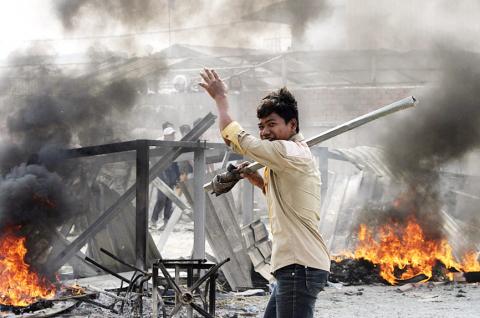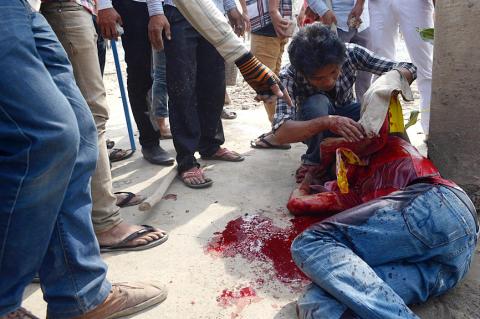Cambodian military police yesterday opened fire with assault rifles to quell a protest by stone-throwing garment factory workers demanding higher pay in a crackdown a human rights group said killed four people.
Chaos during nationwide strikes erupted for a second day as security forces were deployed to halt a demonstration by thousands of workers, who refused to move and threw bottles, stones and gasoline bombs at an industrial zone in Phnom Penh.
The clash represents an escalation of a political crisis in Cambodia, where striking workers and anti-government protesters have come together in a loose movement led by the opposition Cambodia National Rescue Party (CNRP).

Photo: Reuters
Unions representing disgruntled garment workers have joined opposition supporters protesting against the government of Cambodian Prime Minister Hun Sen to demand a re-run of an election in July last year that the opposition says was rigged.
Military police confronting the protesters fired live ammunition, journalists said, and bullet casings were later seen scattered across the ground at the scene.
The clashes took place at Canadia Industrial Park, home to dozens of factories that make clothing for Western brands.

Photo: AFP
Human rights group LICADHO described the incident as “horrific” and lambasted military police, adding that their own investigation and surveys of hospitals had found four people were killed and 21 wounded.
“We condemn this appalling use of extreme lethal force by security forces,” LICADHO director Naly Pilorge said in a statement. “Security forces must now put an immediate end to the use of live ammunition against civilians.”
Spokesmen for the national police and military police said they could not verify the number of casualties.
The CNRP, led by former Cambodian finance minister Sam Rainsy, has courted about 350,000 garment workers from nearly 500 factories across the country by promising to nearly double the monthly minimum wage to US$160 if it wins a re-run of the July election, which Hun Sen is refusing to hold.
The government is refusing to raise the wage beyond US$100 a month and has ordered factories to reopen to prevent damage to an industry worth US$5 billion a year.
TAIWANESE FIRMS
Taiwanese garment makers Eclat Textile Co (儒鴻) and Makalot Industrial Co (聚陽) shut down their Cambodian factories for a week starting on Thursday last week and relocated their production to factories in neighboring countries.
The temporary shutdown was suggested by the Garment Manufacturers Association in Cambodia, the two firms said in filings to the Taiwan Stock Exchange yesterday.
They both said the strike would have little impact on their revenue and earnings.
“We reopened our factories on Jan. 2, and some workers have come back to work. But, we will close the factories again, for the safety reasons, if things turn violent,” Makalot public relations manager Mavis Chiu (邱美惠) said by telephone yesterday.
Makalot made 2.33 million units of apparel in Cambodia in 2012, accounting for 25 percent of its total production for that year, according to the company.
Eclat said its factory shutdown will reduce its production by 140,000 pieces of apparel, but that its clients have agreed to postpone their orders.
Eclat said its production capacity in Cambodia was about 450,000 pieces of apparel a month, accounting for 5 percent of its total production.
Additional reporting by Camaron Kao

AGING: As of last month, people aged 65 or older accounted for 20.06 percent of the total population and the number of couples who got married fell by 18,685 from 2024 Taiwan has surpassed South Korea as the country least willing to have children, with an annual crude birthrate of 4.62 per 1,000 people, Ministry of the Interior data showed yesterday. The nation was previously ranked the second-lowest country in terms of total fertility rate, or the average number of children a woman has in her lifetime. However, South Korea’s fertility rate began to recover from 2023, with total fertility rate rising from 0.72 and estimated to reach 0.82 to 0.85 by last year, and the crude birthrate projected at 6.7 per 1,000 people. Japan’s crude birthrate was projected to fall below six,

Conflict with Taiwan could leave China with “massive economic disruption, catastrophic military losses, significant social unrest, and devastating sanctions,” a US think tank said in a report released on Monday. The German Marshall Fund released a report titled If China Attacks Taiwan: The Consequences for China of “Minor Conflict” and “Major War” Scenarios. The report details the “massive” economic, military, social and international costs to China in the event of a minor conflict or major war with Taiwan, estimating that the Chinese People’s Liberation Army (PLA) could sustain losses of more than half of its active-duty ground forces, including 100,000 troops. Understanding Chinese

US President Donald Trump in an interview with the New York Times published on Thursday said that “it’s up to” Chinese President Xi Jinping (習近平) what China does on Taiwan, but that he would be “very unhappy” with a change in the “status quo.” “He [Xi] considers it to be a part of China, and that’s up to him what he’s going to be doing, but I’ve expressed to him that I would be very unhappy if he did that, and I don’t think he’ll do that. I hope he doesn’t do that,” Trump said. Trump made the comments in the context

SELF-DEFENSE: Tokyo has accelerated its spending goal and its defense minister said the nation needs to discuss whether it should develop nuclear-powered submarines China is ramping up objections to what it sees as Japan’s desire to acquire nuclear weapons, despite Tokyo’s longstanding renunciation of such arms, deepening another fissure in the two neighbors’ increasingly tense ties. In what appears to be a concerted effort, China’s foreign and defense ministries issued statements on Thursday condemning alleged remilitarism efforts by Tokyo. The remarks came as two of the country’s top think tanks jointly issued a 29-page report framing actions by “right-wing forces” in Japan as posing a “serious threat” to world peace. While that report did not define “right-wing forces,” the Chinese Ministry of Foreign Affairs was